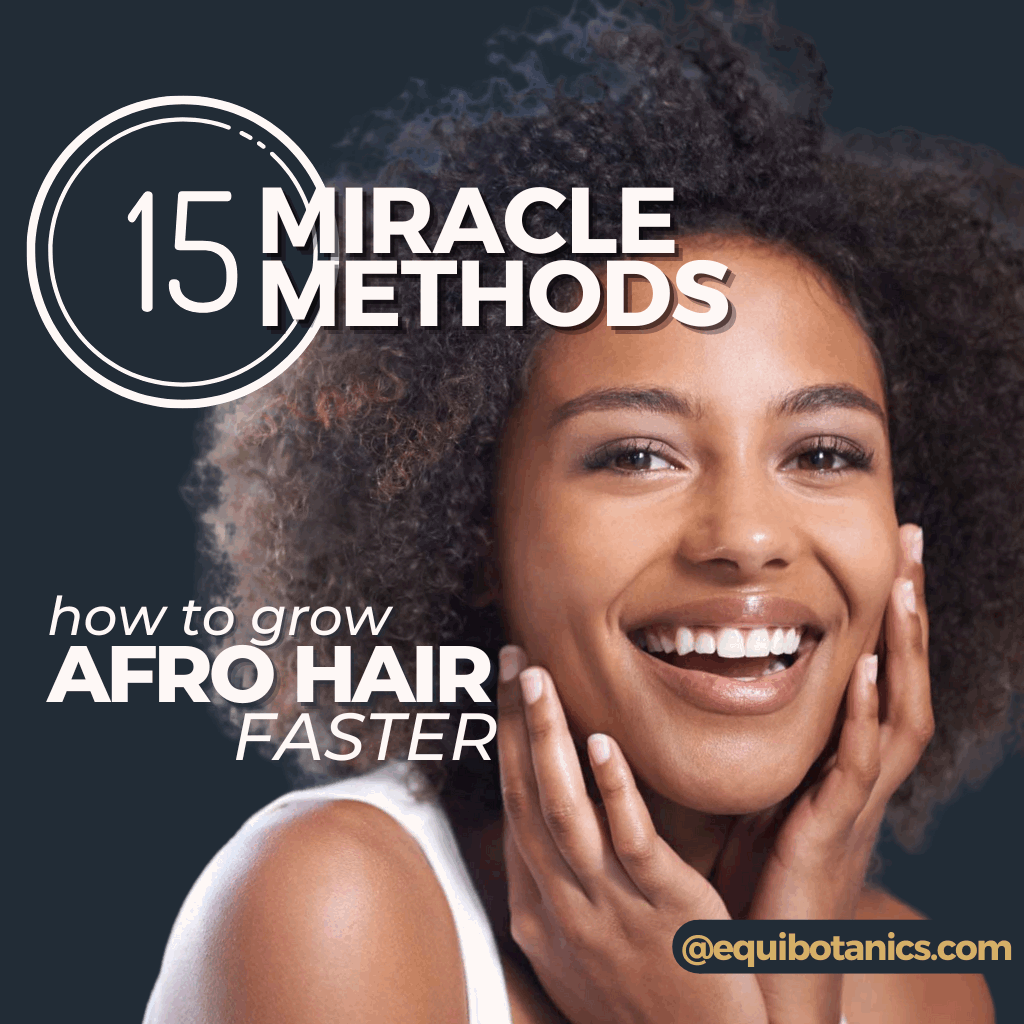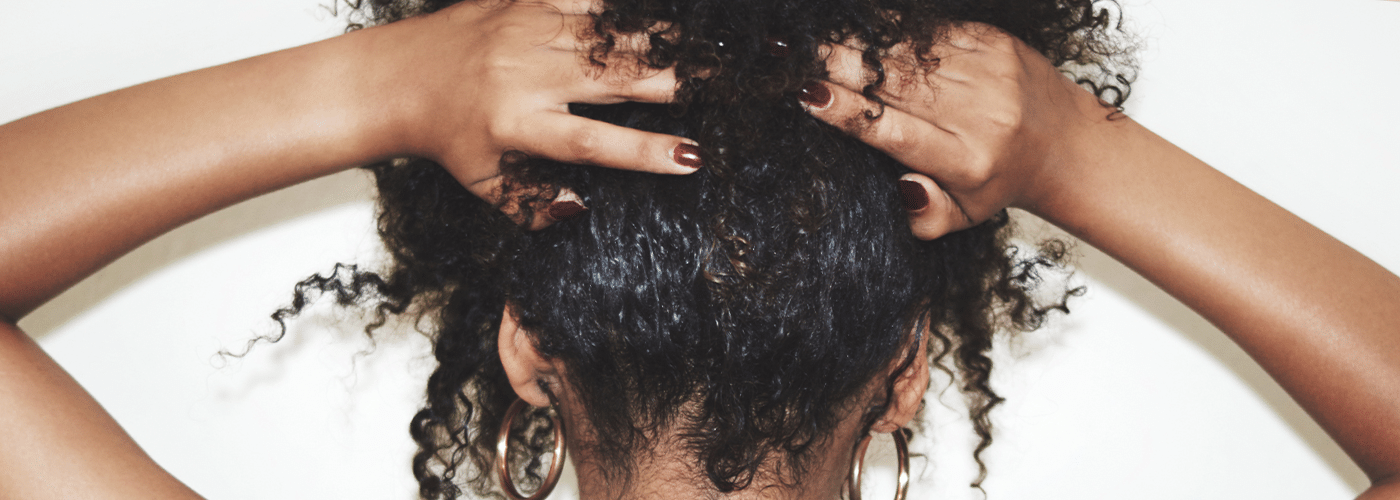
Growing afro hair can sometimes seem like an impossible task. One thing is for certain, however, and that’s that it requires dedication and a whole heap of patience. Scientifically, black hair is the slowest growing hair type due to its elliptical shape and only grows about one third of an inch per month.
Alongside slow black hair growth, you'll likely also encounter issues such as breakage, thinning and shedding whilst trying to grow your afro hair; typically, this is due to dehydration. From intense moisturisation to heat protection, as well as increasing your vitamin intake, we’ve got all the tips and tricks right here to encourage your black hair to grow faster.
Key Summary
There are different types of black and afro hair but the common link between them is that they struggle to retain moisture.
To encourage hair to grow it is important to keep hair hydrated.
Steps you can take to grow black hair quickly include regular hair treatments, a balanced diet, reduced heat styling, and scalp massages.
It is important to remember that hair growth requires patience and consistency. Hair does not grow overnight but you will start to see progress within 3 months.
Types of Afro Hair

The first step in stimulating greater afro hair growth is to identify which type of hair you have. There are three main types of black and afro hair which can be broken down as follows:
- Type 2 (wavy hair)
- Type 3 (curly hair)
- Type 4 (coily hair)
Type 2 hair tends to be thin but easy to handle, whilst on the other end of the spectrum, type 4 hair is typically very fragile (as well as being hard to grow).
Secrets to growing black hair long and fast
The secret to unlocking quicker hair growth lies predominantly with moisture.The natural waved or coiled shape that black hair takes means that moisture struggles to travel down the strands leaving locks dehydrated and more prone to breakages which, of course, hinders any growth efforts.
If you are looking to encourage quick hair growth, focus your efforts on hydrating your locks with naturally derived hair care, masks, and oils.
Other ways to encourage growth and promote overall hair health include maintaining a healthy diet that focuses on vitamins and nutrients important to hair health, reducing the use of hair extensions, gentle brushing, and regular trims.
Finally, remain patient and consistent. If you don’t develop a regular routine to support your hair health then the progress will not be as quick.
How to make black hair grow faster overnight
Throughout your hair growth journey, it is important to keep your expectations realistic. If you are looking at how to grow natural black hair in a week or overnight, you need to realise that this is unlikely. Although hair will grow within a week, it will be a small amount that is not noticeable.
When it comes to how to grow black hair, 3 months is a more realistic time frame to expect to see significant growth. So now let’s take a look at the tips and tricks to encourage quicker growth.
Step-by-Step: How to Grow Black Hair
Although it might not seem like it, achieving healthy, strong black hair with length really is possible, even if you’ve previously come up against obstacles like breakages. Follow these steps to help manage your afro hair and improve its condition, and start to see your natural hair grow in as little as one week.
1. Keep it Moisturised
As already mentioned, one of the biggest issues for those with curly, black or afro hair is that these hair types find it challenging to retain moisture, making your locks dehydrated. We’re all aware of how important it is to keep our bodies hydrated, but the same is also required for healthy, happy hair.
With the natural helix shape of coiled or curly hair making it a challenge for moisture to make its way down the hair strands, your main focus needs to be keeping your locks hydrated.
Find a set of designated products, like this Afro Hair Growth Set, which focuses on moisturising your hair at every point of the hair wash and care routine as this will help your black hair grow faster and thicker. A targeted set of products will leave you in the best position to see swift hair growth progress.
Afro Hair Care Growth Set
We've jam-packed this Growth Set with luxurious ingredients to give you a kickstart on your hair growth journey. We've selected our best-selling and hair replenishing treatments as part of the set. And because we really want you to have a great time, we're giving this set away for less than getting each product individually.
Other ways to keep on top of your tresses and their moisture levels include using a hair oil, applying deep conditioners and regularly applying hair masks, all of which work to combat the effects of dryness, keeping hair nourished and quickly improving your hair’s hydration levels.
An intense hydration boost is also a great step for fighting the effects of frizz which can lead to knots and breakages.
2. Not so Hot

It’s common knowledge that heat styling can damage hair by causing split ends and breakages, as well as dehydrating your locks. It isn’t just your hair drying and styling tools that can have an impact though; the sun with its UV rays can also dry your locks out. Vitamin E can help to provide protection from sun damage so aim to increase your dietary intake of this, wherever possible.
Keep heat styling to a minimum and always apply a heat protectant spray before use. It’s also worth investing in an SPF hair product to limit the effects that the sun can have on your hair. Another great idea, simple though it may seem, is to pop a hat on when exposed to direct sunlight.
3. Say No to Sulphates

Many big haircare brands use chemicals in their products that hinder, rather than help, the health of your hair. Sulphates are put into shampoos to create that thick, foamy lather that many associate with cleansing, but the lather in a shampoo isn’t what cleans your hair and isn’t essential to the product.
Sulphates are known to strip hair of essential oils and moisture as well as damaging scalp health. Stick to hair care products with naturally-derived ingredients, such as the Baobab Hair Detangler & Cleanser, that aren’t just kind to your locks and scalp, but to the environment, too!
Baobab Hair Detangler & Cleanser
We prefer to avoid calling this a detangling shampoo. Instead, we call ours a detangling cleanser because it’s softening and moisturising while cleansing thoroughly. It also acts as your pre-poo detangler before you wash. Are you tired of that stripped feeling after you’ve just washed your hair? Wash your hair not strip it of its natural oils.
4. Gentle Brushing

The dry and frizzy tendencies of black hair can make it more prone to tangles and matting, meaning you’ll never want a brush too far from reach. But whilst it might be tempting to yank the brush right through, this certainly isn’t the best move for your tresses!
Roughly pulling a brush through knotted hair is going to place stress on both the root and hair follicle and can also lead to breakage and snapping, something which is entirely counter-productive for those wanting to see hair growth.
Divide your hair into small sections to make it more manageable and gently tease the comb through your hair. Detangling sprays can help brushes glide through with greater ease. Not only should you avoid yanking your brush through knots, it’s also much better to avoid brushing hair whilst wet. The reason? Wet hair is at its most vulnerable and therefore more likely to break.
5. Avoid Excessive Styling

If you’re keen to see hair growth quickly, then avoid placing your hair under additional stress through regular changes in hair styles. Whilst some hair styles protect the hair – braids, for instance – you should try to leave them in place for up to 10 weeks at a time. You’ll notice the difference in your black hair growth in no time!
6. Ditch the Extensions
In your search for longer hair, you may well have turned to extensions to help fulfil that dream. This could actually be hindering your chances of natural, long black hair, however. Traction alopecia is all too commonly seen by trichologists with hair extensions being the main cause. When extensions are applied, particularly when used with glue, it causes tension and the constant pulling can lead to breakages as well as follicle damage.
7. Wrap it Up

You wouldn’t think that going to sleep could negatively affect the growth rate of your locks, but if you're sleeping on a cotton pillowcase then this could be decreasing the rate at which your hair grows.
Sleeping with exposed hair on a cotton pillowcase can encourage hair to fall out as well as causing friction which can lead to breakages. Use a silk pillowcase for a frictionless snooze that protects your hair and helps to maintain its condition.
Another useful tool to add to your hair care routine is a silk hair wrap. Silk’s smooth surface helps protect hair cuticles, and is a less absorbent material than cotton or satin so your hair won’t be stripped of its natural oils or moisture. This leaves your hair less dehydrated as a result.
8. Up the Vitamin Intake

A balanced diet is a key factor in helping maintain a healthy body, but the vitamins and minerals you consume can also play a big part in helping your hair to grow, too. If you neglect your diet, this will likely be reflected in your hair’s appearance, quality and growth (or lack, thereof).
There are a variety of hair-targeted multivitamins available to purchase but, of course, you could always boost your intake of essential nutrients for hair through your diet, too. Vitamins and minerals that are beneficial for hair health include:
Vitamin A
- Sebum production is reliant on vitamin A. Sebum helps to maintain a healthy scalp and, without it, hair may become dry and therefore more prone to breakage. Find vitamin A in foods such as carrots, mangos and sweet potatoes.
Vitamin B
- Found in broccoli, spinach and peas, vitamin B helps with hair growth. B vitamins carry oxygen to the scalp so that the follicles can create new hair.
Vitamin E
- Protect hair from sun damage by consuming a diet rich in vitamin E. Nuts are a great source of this vitamin, and also help increase your zinc and protein levels that are also needed for healthy hair.
Zinc
- Low zinc levels can lead to a dry, flaky scalp and hair loss. Keep a healthy, balanced scalp by increasing your zinc intake with food such as beef, eggs and wholegrains.
Biotin
- A hair powerhouse that’s considered essential to hair health. It’s actually a B vitamin but deserves its own section because too little biotin can cause brittle tresses and hair loss. Biotin sources include wholegrains, eggs and yeast.
Iron
- A lack of iron is a major cause of hair loss and could be affecting your growing progress. Iron-rich foods include red meat, edamame beans, dried fruit, and fortified breakfast cereals.
Protein
- Hair is made up of protein, so it’s hardly surprising that it’s needed in your diet to keep your locks healthy and strong. If your diet lacks protein, hair is likely to become dry and brittle which can cause hair loss as well as limiting growth. Eggs, dairy, nuts and chicken are all high-protein foods.
9. Introduce an Oil

If you haven’t used an oil on your hair then now is a great time to try one and benefit from the instant improvements to your locks. Hair oils such as coconut, jojoba, argan or black seed oil are ideal for locking in moisture and restoring hydration to dried-out hair. You could even pop a few drops of peppermint oil into your shampoo for added hair growth stimulation.
Black seed oil, in particular, is known for its naturally restorative properties (as well as helping to darken greying hair, offering an added benefit). It has antibacterial, antifungal and anti-inflammatory properties that work to protect both the hair and scalp. It works to slow down shedding and hair loss whilst stimulating growth at the same time. Try this Black Seed Hair Oil Elixir if you’re looking for black hair products that promote growth speedily!
Black Seed Hair Oil Elixir
This Black Seed Oil For Hair is enriched with Fenugreek, Brahmi and Bhringaraj ayurvedic oils, our first hair serum is your best bet to reaching your hair goals. Stop split ends, check. Stop itchy scalp, check. Help accelerate growth, check check check. We've jam-packed this little bottle with luxurious ingredients from the Caribbean, India and the Amazonian rainforest to give you longer, thicker, and stronger hair in less time.
There are several different ways that you can use hair oil. We would recommend using it as an intensive, mask-like treatment once a week. Simply apply the oil to your hair, cover with a cap and leave for at least 20 minutes before a hair wash. It’s also a good idea to apply an oil to your hair after washing as an extra nourishing dose of moisture for both the hair and scalp.
Top tip: If you feel like the lengths and ends of your hair are starting to feel dry and frizzy throughout the week, run a few drops of oil through it to maintain hydration levels!
10. Deep Conditioners (and Hair Masks) are your ‘BFF’

Deep conditioning and hair masks often help to support the role played by hair oil. If you are suffering from dry, dull hair that breaks and sheds easily – or, perhaps you're a regular user of chemical hair treatments that leave your hair a bit parched – then deep conditioning is the best choice.
If you feel that your hair is particularly damaged, then use a deep conditioner. For how long, we hear you ask? To start with, use the conditioner once a week but ensure that, once its condition has improved, you reduce that usage to twice per month. A hair mask is the ultimate intensive treatment for dehydrated hair that lacks moisture. Let these rich, targeted formulas hug your hair from root to tip and expect to see some serious hair growing almost overnight!
11. Daily Scalp Massages

Another great hair stimulation technique is the scalp massage. Performing a daily scalp massage stimulates the hair follicles to produce thicker hair and growth. Try introducing this for 5 minutes per day and see results in as little as 8 weeks when used with a stimulating hair oil and other growth supporting products.
Stress and anxiety can be a factor in hair loss. By introducing massage techniques, not only will you be supporting your hair and scalp health, but you could also be working to relieve some stress and tension throughout your body.
12. Don’t Over-Wash Hair

Regular use of shampoo tends to dry the hair out so try to stick to hair washing once a week. Moisture is the key to hair growth and if you are washing your locks too frequently, it can strip the hair of essential oils and hydration leading to breakages and damage.
If you feel like your hair needs washing more frequently than this, you could introduce a rice water wash. Using rice water is known to grow hair due to its naturally occurring amino acids. Not only this, but it increases volume and shine so it’s a complete win-win!
Whilst it isn’t essential to use shampoo every time you wash your hair, we would always recommend using a conditioner to maintain its health.
13. Regular Trims

It’s only natural that you may be apprehensive to give your hair a trim and lose some of the precious growth you’ve achieved, however this can negatively impact your hair growth progress.
New hair grows from the roots, but you will only see results if the ends of your hair are in good health, so chop the dead weight by removing dead ends that otherwise will see your hair strands prone to snapping.
14. Care for Your Edges

The edges and ends of hair are far more vulnerable and damage-prone than any other part of your tresses. Tending to be much finer hairs, the edges will require extra care through injections of moisture from oils and other hair hydrators.
Braiding hair keeps the ends far less exposed than if hair is just loose and hanging down. If you use a toothbrush to comb your edges into place, then switch to a soft-bristled brush to avoid placing hair under unnecessary tension.
15. Consistency is Key

Developing a hair care routine is going to be key to your black hair growth success. If you are keen to reach your hair goals swiftly then be sure to create a consistent routine that you stick to. Steps we would advise to put into your hair routine include:
Washing hair with shampoo once per week.
Using a hair mask or deep conditioning, with a product such as the Babassu Oil Treatment Hair Masque, twice per week.
Babassu Oil Treatment Hair Masque
The Babassu Deep Treatment Hair Masque is an intensive protein-moisture balanced treatment that applies a restorative formula to the hair, using steam to encourage absorption into the hair shaft. It is jam-packed with Brazilian butter, Tucuma and Murumuru seed butters and revitalising oils to nourish your hair. It’s so rich and gets to work for longer, you only need to apply it once or twice a month.
Frequently Asked Questions
How Long Does it Take to Grow an Afro?
There’s no real time scale when it comes to afro hair growth as it’s going to be dependent on the condition of your hair and whether you have type 2, 3 or 4 hair. Sadly, you can’t make hair grow faster overnight!
The curlier your hair is, the longer it will take to grow, and afro hair generally tends to grow slower than any other type with between one half to one third of an inch of hair growth per month. Dry, brittle hair is the most likely cause for your afro not growing.
As such, the best way to increase afro hair growth quickly is to work on having healthy, hydrated hair. Once this is achieved the length will swiftly follow.
Does Aloe Vera Grow Hair?
Aloe vera is a great natural ingredient to add to your hair care regime as it supports the dry tendencies of afro hair by protecting and boosting moisture levels.
Not only is it known for its hydrating qualities, but it also helps to boost hair growth with the presence of proteolytic enzymes.
These enzymes break down dead skin cells on the scalp that can clog hair follicles, slowing or preventing hair growth.
What are Signs of New Hair Growth?
If you’ve been on a quest to grow your afro, then you’ll be desperate to see results. Signs of growth to look out for include:
- Increased baby hairs or fuzz
- Dark spots, or specks, and shadow
- A reduction in hair loss and breakage
- Stronger, more manageable hair
- An increase in hair length
Final Thoughts
There are no quick tricks when it comes to afro hair growth, and consistency and patience are required throughout the journey. The steps above will not only improve your hair health to support and improve growth but also prevent any further hair loss and breakage. Build a routine around these steps and you’ll have long, luscious hair to be proud of in no time at all!


